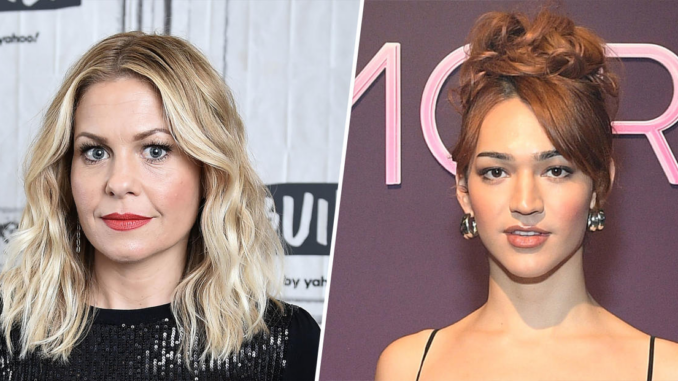
Candace Cameron Bure, known for her role as DJ Tanner on Fuller House, has faced recent accusations claiming she requested the removal of a queer character from the popular Netflix reboot. In a surprising and heartfelt statement, Bure denies these allegations and shares her perspective on inclusivity in television. Let’s delve into what she had to say and explore the broader conversation surrounding representation in media.
The Controversy Surrounding ‘Fuller House’
What Sparked the Rumors?
The controversy began when reports surfaced alleging Bure had influenced creative decisions to exclude a queer character from Fuller House. These claims quickly gained traction, with critics and fans alike questioning her stance on LGBTQ+ representation.
Social Media Backlash
As with most celebrity controversies, social media played a significant role in amplifying the rumors. Hashtags and heated debates filled platforms like Twitter and Instagram, putting Bure in the spotlight for all the wrong reasons.
Fans Divided
While some fans defended Bure, others expressed disappointment, pointing to her public advocacy for traditional family values. The debate reignited conversations about inclusivity in Hollywood.
Candace Cameron Bure’s Response
A Firm Denial
In a recent interview, Bure directly addressed the allegations, stating unequivocally that she never requested the removal of any queer characters from Fuller House.
“It’s Simply Not True”
Bure explained that her role as an actor on the show did not extend to making creative decisions about character development or storylines. “I love everyone, and I believe in inclusivity,” she stated, emphasizing her support for diverse representation.
Clarifying Her Values
While acknowledging her faith and family-oriented values, Bure emphasized that these beliefs do not translate into intolerance or exclusion.
The Showrunner’s Take
To support Bure’s claims, Fuller House showrunner Bryan Behar also stepped forward, confirming that all character and storyline decisions were made collaboratively among writers and producers.

Behind-the-Scenes Decisions
Behar clarified that any perceived lack of LGBTQ+ representation was not the result of pressure from cast members but rather narrative choices made during the writing process.
LGBTQ+ Representation in ‘Fuller House’
A Look at Inclusivity on the Show
Fuller House featured several moments of inclusivity, including diverse friendships and subtle nods to modern family dynamics. However, critics argue that the show could have done more to embrace LGBTQ+ representation.
Missed Opportunities
Some fans pointed out that while the show leaned heavily on nostalgia, it didn’t fully reflect the diversity of today’s society, especially when compared to other contemporary sitcoms.
Moments That Did Shine
Despite criticisms, Fuller House occasionally touched on themes of acceptance and individuality, leaving room for discussions about how to improve representation in future projects.
The Bigger Picture: LGBTQ+ Representation in Media
Why Representation Matters
Television has the power to shape cultural norms and foster understanding. When LGBTQ+ characters are included, it sends a powerful message of acceptance and normalcy.
Progress Over the Years
In recent years, there’s been significant progress in the portrayal of LGBTQ+ characters, with shows like Schitt’s Creek and Euphoria setting new standards for inclusivity.
Room for Improvement
Despite advancements, the industry still has a long way to go. Ensuring that LGBTQ+ characters are authentic and multidimensional remains a challenge.
The Role of Celebrities in Advocacy
Public figures like Candace Cameron Bure wield significant influence. Their words and actions can either support or hinder progress toward inclusivity.
Walking the Line
While celebrities have the right to their personal beliefs, their platforms come with a responsibility to promote acceptance and understanding.
Encouraging Dialogue
Bure’s response to the controversy highlights the importance of open conversations about representation and inclusion.
Moving Forward
Lessons from the ‘Fuller House’ Controversy
The controversy surrounding Bure serves as a reminder of the need for transparency and accountability in the entertainment industry.
A Call for Collaboration
Writers, producers, and actors must work together to ensure that all voices are heard and represented on screen.
Building a Better Future
As fans, viewers can advocate for more inclusive content by supporting shows and films that celebrate diversity.
Conclusion: Candace Cameron Bure’s Commitment to Inclusivity
Candace Cameron Bure’s denial of the allegations underscores her commitment to fostering inclusivity while staying true to her values. This controversy has sparked important conversations about LGBTQ+ representation in media, highlighting both progress and areas for growth. As Hollywood continues to evolve, fans and creators alike play a vital role in shaping a more inclusive future.
FAQs
1. Did Candace Cameron Bure have creative control over ‘Fuller House’?
No, Bure clarified that she was not involved in making creative decisions for the show.
2. What did Bure say about the allegations?
She denied the claims, stating they were “simply not true” and reaffirming her support for inclusivity.
3. How did the showrunner respond to the controversy?
The showrunner confirmed that creative decisions were made by the writers and producers, not the cast.
4. Was LGBTQ+ representation present in ‘Fuller House’?
While there were moments of inclusivity, critics believe the show could have done more to reflect modern diversity.
5. How can fans advocate for better representation in media?
By supporting inclusive content and engaging in discussions about the importance of diversity on screen.
